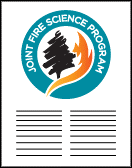United States Joint Fire Science Program

Joint Fire Science Program Research Project Reports
Document Type
Article
Date of this Version
2012
Citation
Final Report to the Joint Fire Science Program, Agreement #10‐JV‐235
Abstract
This project has explored the hypothesis that public fire suppression in fire‐prone areas acts as a subsidy to landowners, incentivizing conversion of land to residential and commercial development. Landowners do not bear the full cost of their choice to build on land in fire‐prone areas, since they do not pay for suppression, though they reap all of the benefits, potentially resulting in economically inefficient levels of development. To test this hypothesis, we performed an econometric analysis of U.S. land use change between 1970 and 2000. Statistically, we identified the impacts of changes in fire suppression policy by exploiting a natural experiment – a major but temporary policy shift toward increased suppression that took place as a result of the significant Yellowstone fires during the summer and fall of 1988 – as well as variation in the benefits of fire suppression based on proximity to federal lands. We also implemented another set of tests based on the fact that the Southeast did not experience this strong return to suppression after the Yellowstone fires. Models control for underlying trends in development over time and across states, and, in most models, within parcels. Results suggest that when federal suppression efforts intensify on public lands, private development accelerates nearby. The main paper produced by the funded research thus shows that public investment in reducing the damages from fire in the short run causes unintended long‐run behavioral responses, which may increase future hazard exposure. The PIs wrote two additional articles, one published as an academic book chapter, and the other published for non‐research audiences in the policy community, summarizing the broader implications of the research, and laying out an agenda for future empirical economic research on federal fire policy and private landowner behavior. In addition to informing federal fire suppression policy, our econometric results are directly relevant to ongoing debates over preparedness for and response to hurricanes, droughts, floods, and other events that become natural disasters when they occur in highly populated areas, and that may be expected to occur with increasing frequency due to the changing global climate.
Included in
Forest Biology Commons, Forest Management Commons, Natural Resources and Conservation Commons, Natural Resources Management and Policy Commons, Other Environmental Sciences Commons, Other Forestry and Forest Sciences Commons, Sustainability Commons, Wood Science and Pulp, Paper Technology Commons


Comments
US government work.